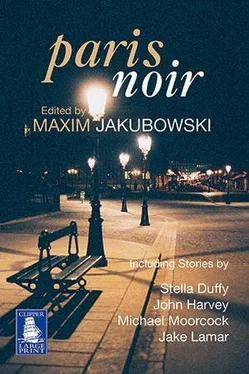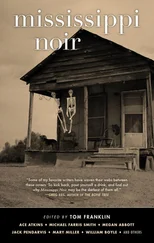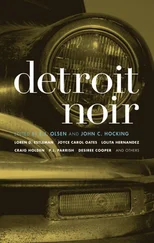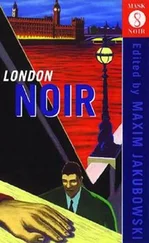Maxim Jakubowski - Paris Noir
Здесь есть возможность читать онлайн «Maxim Jakubowski - Paris Noir» весь текст электронной книги совершенно бесплатно (целиком полную версию без сокращений). В некоторых случаях можно слушать аудио, скачать через торрент в формате fb2 и присутствует краткое содержание. Жанр: Детектив, на английском языке. Описание произведения, (предисловие) а так же отзывы посетителей доступны на портале библиотеки ЛибКат.
- Название:Paris Noir
- Автор:
- Жанр:
- Год:неизвестен
- ISBN:нет данных
- Рейтинг книги:3 / 5. Голосов: 1
-
Избранное:Добавить в избранное
- Отзывы:
-
Ваша оценка:
- 60
- 1
- 2
- 3
- 4
- 5
Paris Noir: краткое содержание, описание и аннотация
Предлагаем к чтению аннотацию, описание, краткое содержание или предисловие (зависит от того, что написал сам автор книги «Paris Noir»). Если вы не нашли необходимую информацию о книге — напишите в комментариях, мы постараемся отыскать её.
Edited by Maxim Jakubowski, the stories range from quietly menacing to spectacularly violent, and include contributions from some of the most famous crime writers from both sides of the Atlantic, as well as the other side of the Channel.
Paris Noir — читать онлайн бесплатно полную книгу (весь текст) целиком
Ниже представлен текст книги, разбитый по страницам. Система сохранения места последней прочитанной страницы, позволяет с удобством читать онлайн бесплатно книгу «Paris Noir», без необходимости каждый раз заново искать на чём Вы остановились. Поставьте закладку, и сможете в любой момент перейти на страницу, на которой закончили чтение.
Интервал:
Закладка:
‘The civilisation to which I belong is neither truly human nor truly of this universe. Its rulers are men and women who are capable of manipulating the forces of nature and, if you like, super-nature to serve their own ends. They are sometimes, in this world, called sorcerers. How they learn their sorcery is by making use of their dream couches, sleeping sometimes for thousands of years while they live other lives. In those other lives they learn all kinds of arcane wisdom. Upon waking, they forget most of the lives they have ‘dreamed’ save for the skills of sorcery, which they employ to rule the world of which their land is the imperial centre. I am one of those aristocrats. The island where I dwell is known, as far as I can pronounce it in your language, as Melnibone. We are not natives of that world, either, but were driven to inhabit it during a terrible upheaval in our history which ultimately turned us from peaceful beings into the cruel rulers of a planet.
’The demonic archangel upon whom of Klosterheim called to aid him is our own patron Lord of Chaos. His name is Arioch. Both your Bible and the poet Milton mention him. On occasions, he inhabits that black blade you saw me use. On other occasions, the sword contains the souls of those its wielder has killed. Some part of those souls are transferred to whoever uses the blade. Other parts go to placate Arioch. When Satan attempted, hundreds of years ago, on this plane – or one very much like it – to be reconciled with God, neither Klosterheim nor Arioch accepted this and have, across many planes of the multiverse, sought not only the destruction of God himself, but also of Satan – or whatever manifestations of those forces exist here.’
’You have still not explained whose soul Klosterheim’s body drank,’ pointed out Sinclair.
‘Why, the last soul it took,’ said Monsieur Zenith in some surprise. ‘I thought that is what you understood.’
‘And whose was that-?’
Monsieur Zenith had risen swiftly and elegantly and was kissing Mrs Persson’s hand, moving towards the shelf where he had placed his silk hat and gloves. ‘You must forgive me. I have some unfinished business at a nearby art gallery.’
Almost instinctively, Commissaire Lapointe rose as if to apprehend him but then sat down again suddenly.
Sir Seaton Begg, with dawning comprehension, laid his hand on his old friend’s arm, but Taffy Sinclair was insistent. ‘Whose, Monsieur Zenith? Whose?’
Monsieur Zenith slipped gracefully from the table and seemed to disappear, merging with the sunlit spray of the fountain.
‘Whose?’ Sinclair turned baffled to look at Mrs Persson, who had taken her two cats into her lap and was stroking them gently. ‘Do you know?’
She inclined her head and looked questioningly, intimately at Sir Seaton Begg, whose nod was scarcely perceptible.
‘It was his own, of course,’ she said.
NEW MYSTERIES OF PARIS by BARRY GIFFORD
I was recently told a story that was so stupid, se so melancholy, and so moving: a man comes in into a hotel one day and asks to rent a room. He is shown up to number 35. As he comes down a few minutes later and leaves the key at the desk, he says: ‘Excuse me, I have no memory at all. If you please, each time I come in, I’ll tell you my name: Monsieur Delouit. And each time you’ll tell me the number of my room.’ ‘Very well, Monsieur.’ Soon afterwards, he returns, and as he passes the desk says: ‘Monsieur Delouit.’ ‘Number 35 Monsieur.’ ‘Thank you.’ A minute later, a man extra ordinarily upset, his clothes covered with mud, bleeding, his face almost not a face at all, appears at the desk. ‘Monsieur Delouit.’ ‘What do you mean, Monsieur Delouit? Don’t try to put one over on us! Monsieur Delouit has just gone upstairs!’ ‘I’m sorry, it’s me… I’ve just fallen out of the window. What’s the number of my room please?’
André Breton, Nadja
Nadja was taken to a madhouse in 1928. Some place in the French countryside where ordinary people, those fortunate enough to have escaped scrutiny, who have avoided so far in their lives being similarly judged and sentenced and dismissed from the greater society, will not be reminded of their own failings by the screams of the outcast.
It is reasonable to suppose that by that time there could not be much difference for Nadja between the inside of a sanatorium and the outside – but Nadja was here, she left something of herself. Certainly she’s dead by now, buried in a field behind an insane asylum, cats screwing on her grave.
The day she threatened to jump from the window of her room in the Hotel Sphinx on the boulevard Magenta I should have known she was not a fake. Who can tell the genuine mad from the fake? Nadja could. She was always pointing them out to me. In a café she’d whisper, ‘Look at her. Biting her nails. Pretending to be waiting for someone. She’s a fake. Her lovers disappear.’ ‘But how can you tell,’ I’d ask. ‘Look at my eyes,’ Nadja would say. ‘Can you see the way they are lit from behind? I’m dangerous. To be avoided.’
Who was Nadja? What was the significance of Nadja in my life? Why does she return, a constant, though I’ve neither seen nor heard of or from her in fifty years?
I saw a woman in a marketplace in a Mexican city, Merida, perhaps, in the Yucatan, twenty years ago or so. She resembled Nadja, or what she might have looked like, according to my idea of Nadja had she still been alive, let alone an inhabitant of a jungle town in Mexico. I followed her as she moved from stand to stand, inspecting the fruits, dresses, beads, kitchen knives, crucifixes. Was this a woman or a phantom? Her grey hair was worn long and thick and fell across her face so that her features were indistinct, shadowed. Nadja had been blonde, with the short, curled haircut of the day, a brief nose, sharp black hawk’s eyes, a long mouth with slender lips, purple, that grinned in one corner only. This hag in the marketplace was fat, toothless, I would say, judging by the line of her jaw, dark-skinned. Nadja had been white as the full moon of February over Venice, almost emaciated, seldom are, with a full mouth of teeth, crooked but strong. She was capable of cracking open with ease in one swift bite a stalk of Haitian sugarcane.
How could I imagine this hideous, crumbling jungle creature to be Nadja? Some feeling made me follow until, crossing a busy street, I lost sight of her. I panicked and looked around wildly. She was gone and I was forced to suppress a great scream of pain. Unused to this severe sort of anxiety, I battled to control my emotions, there in the midst of a crowd of Indians.
It was what Nadja had meant when she stuck her tongue into my ear as we rode in a cab along the boulevard Raspail. As quickly as she’d done it she withdrew to the opposite corner of the seat and said, staring blankly ahead, ‘To me nothing is more terrifying than the curse of self-fulfilment.’
What did Nadja do before we met? I asked her many times and mostly she would avoid answering by laughing and kissing me, adjusting my tie, or brushing my lapels. She did tell me she was born in Belgium, near Ghent, and that her father raised flowers. She went to the local school, a convent, and moved to Paris when she was seventeen. She met a man, unidentified, got married, gave birth to a daughter, who promptly died of pneumonia. Those were facts, according to Nadja. The man was gone soon after the daughter.
Other than that there was little Nadja would admit. None of it was important, she said. ‘Not to you!’ She instructed me to invent her story, it was all the same, unrelated to today. ‘Who is the hero of a film that has at its centre a peacock flying through and landing in the snow?’ Nadja asks, licking my chin as if she were here.
Читать дальшеИнтервал:
Закладка:
Похожие книги на «Paris Noir»
Представляем Вашему вниманию похожие книги на «Paris Noir» списком для выбора. Мы отобрали схожую по названию и смыслу литературу в надежде предоставить читателям больше вариантов отыскать новые, интересные, ещё непрочитанные произведения.
Обсуждение, отзывы о книге «Paris Noir» и просто собственные мнения читателей. Оставьте ваши комментарии, напишите, что Вы думаете о произведении, его смысле или главных героях. Укажите что конкретно понравилось, а что нет, и почему Вы так считаете.











